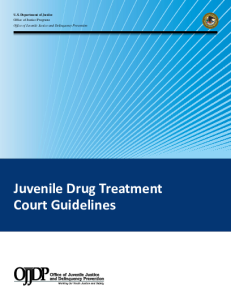
Office of Juvenile Justice and Delinquency Prevention.
Keywords: Best Practices; Courts; Judges; Juvenile Justice; Policy; Substance Use Disorder and Treatment
This resource includes LGBTQ+ court guidelines specifically targeted to help ensure LGBTQ+ youth who participate in a juvenile drug treatment court (JDTC) receive equitable care, including:
- Guideline 2.5: JDTCs should ensure that eligibility criteria result in equity of access for all genders; racial and ethnic groups; and youth who are lesbian, gay, bisexual, transgender, queer or questioning, intersex, and gender nonconforming (LGBTQI-GNC) and Two-Spirit.
- Guideline 7.1: Court and treatment practices should facilitate equivalent outcomes (e.g., retention, duration of involvement, treatment progress, positive court outcomes) for all program participants, regardless of gender, race, ethnicity, or sexual orientation.
- Guideline 1.4: Juvenile justice professionals who work with LGBTQI–GNC youth will also benefit from training on concepts such as sexual orientation, gender identity, and gender expressions, as well as Prison Rape Elimination Act standards, rules, and regulations pertaining to this population. Such training will allow those who work in the field to assess any inherent biases and enhance their knowledge of discriminatory practices or policies that can interfere with the administration of fair and beneficial treatment to LGBTQI–GNC youth. Further, this training will stress that all youth deserve to be treated with fairness, dignity, and respect regardless of their gender identity or means of expression.
File : pdf with 1.21 MB in size
Juvenile Drug Treatment Court Guidelines